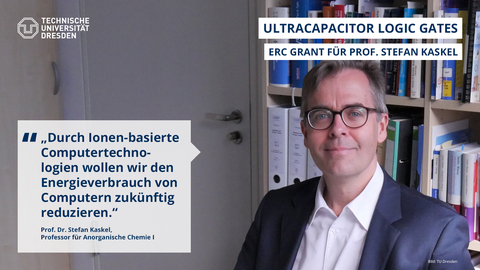Apr 26, 2022
ERC Advanced Grant for Prof. Stefan Kaskel
The European Research Council (ERC) has now announced that Prof. Stefan Kaskel is one of a total of six TUD scientists to receive funding in the millions for his cutting-edge research.
Computing architectures play a key role in everyday life, but they also consume vast amounts of energy. With the "Ultracapacitor Logic Gates" (IONOLOGIC) project, Stefan Kaskel, Professor of Inorganic Chemistry at TU Dresden, and his team want to break new scientific ground in this field. To this end, he is taking inspiration from signal processing in physiological nervous systems. This is based on ions and chemical information and is highly optimized for low energy consumption. His project IONOLOGIC aims at the conceptual design and realization of capacitive logic gates (AND, OR, NAND, etc.) based on electroadsorption in nanoporous materials. These form the elementary building blocks of future computer architectures. Ion-based computing technologies pave the way to reduce the energy consumption of computers as well as to enable on-chip energy management in autonomous microelectronic devices and biological interfaces. For this project, Prof. Kaskel is funded with an ERC Advanced Grant of €2.38 million for the next five years. This is already the second Advanced Grant for him. His Advanced Grant project from 2017 "Amplipore" deals with porous materials for applications in energy and environmental technologies. With his new project, the chemist is now entering previously uncharted territory: "Through IONOLOGIC, it will be possible for me and my team to enter completely uncharted scientific territory, a highly interdisciplinary field at the interface between electrochemistry, biological interfaces and microelectronics."
The ERC Grants from the EU – the most renowned funding body for top research in Europe – support the best researchers in implementing the most brilliant ideas. The ERC was part of “Excellent Science” – the first pillar of the EU’s “Horizon 2020” program for research and innovation (H2020, 2014–2020). It has since been incorporated into the “Excellent Science” pillar of the European Union’s new program for research and innovation “Horizon Europe” (2021–2027).
ERC Grants are 100% grants, which means that they cover all costs incurred as part of a project – personnel costs, consumable supplies, travel, publication costs, equipment, subcontracts, etc. This makes it possible to establish or consolidate entire research groups.

